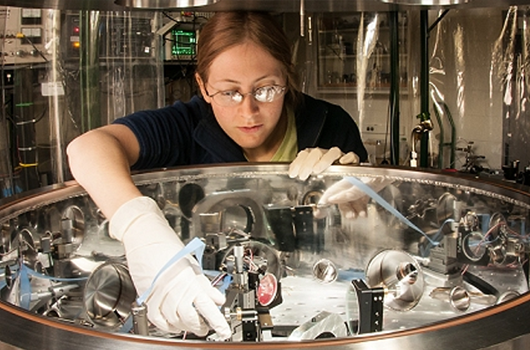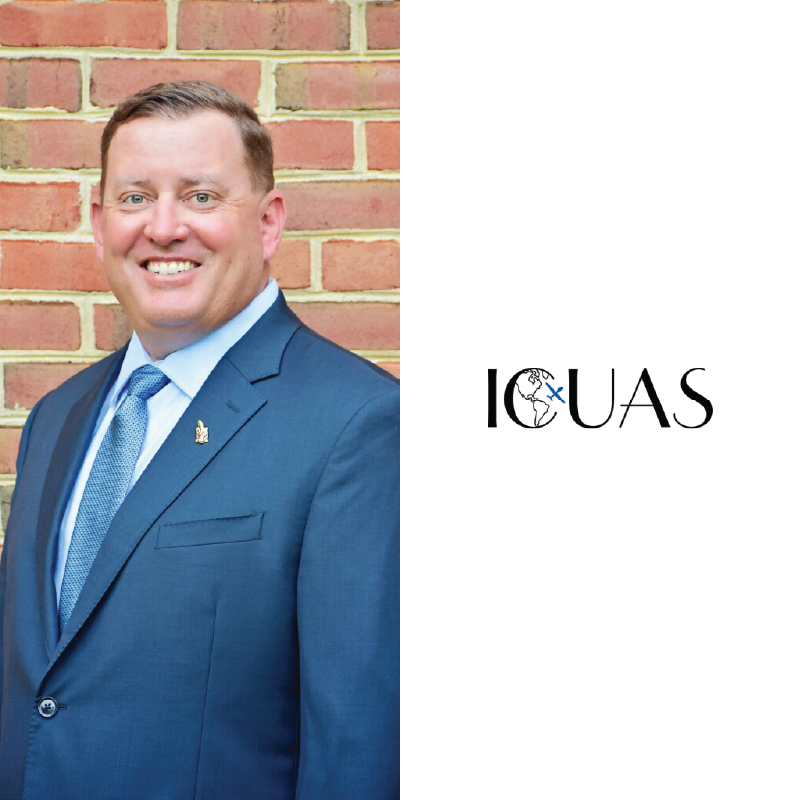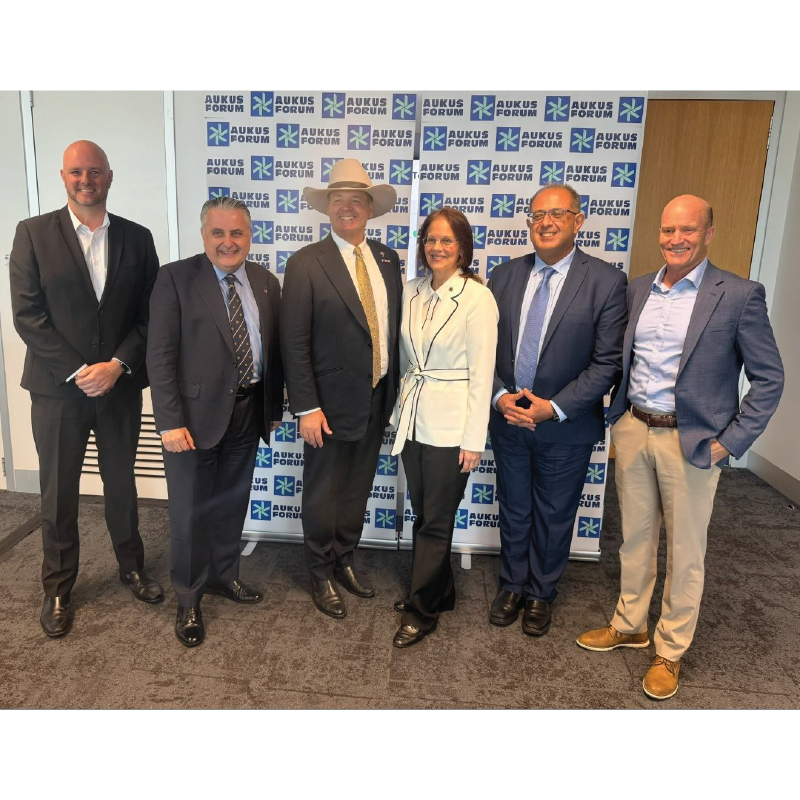Research Institutes
The Institute for Systems Research (ISR) advances and exploits fundamental methodological tools—intelligent control, modeling and optimization, communications and signal processing, computing, operations research, human factors, reliability and risk assessment, and systems integration—to solve systems engineering problems. The institute has produced enabling technologies for manufacturing processes, consumer products, and very large-scale engineering systems such as hybrid communication networks and made important contributions to basic research and education. ISR offers a full range of collaboration options for interested corporations.
A joint institute of the Clark School and the College of Computer, Mathematical and Physical Sciences, the Institute for Research in Electronics and Applied Physics applies basic science skills to practical problems and engineering skills to fundamental scientific investigations. The institute is recognized internationally in high-temperature plasma physics, plasma spectroscopy, relativistic microwave electronics, high-brightness charged particle beams, laser-plasma interactions, nonlinear dynamics (chaos), ion beam microfabrication techniques, microwave sintering of advanced materials, nanoscience, and nanotechnology.
To significantly boost the state's research capacities in bioscience and biotechnology—thereby increasing scientific discovery, technology transfer, and economic development—the Institute for Bioscience and Biotechnology Research (IBBR) brings together the research strengths of the University of Maryland College Park, the University of Maryland Baltimore (including the schools of medicine, pharmacy, dentistry, and nursing), the National Institute for Standards and Technology, and the former University of Maryland Biotechnology Institute. IBBR participates in the Maryland BioChip Collaborative.
The Institute for Physical Science and Technology (IPST) pursues interdisciplinary research and education at the University of Maryland. IPST provides support for theoretical and experimental research in areas at the intersection of traditional disciplines. Current research programs are in the areas of applied mathematics, biophysics, chaotic dynamics, chemical physics, optical physics, space physics, scientific computation, and statistical physics.
The Maryland Energy Innovation Institute (MEI2) provides a platform to catalyze basic research into new technology while stimulating economic growth and improving millions of lives across the state of Maryland. The Institute brings together science, industry, government, and economic leaders to develop new energy technologies and facilitate the transfer of technology ideas into a reality.
The Robert E. Fischell Institute for Biomedical Devices is bringing together skilled scientists, medical doctors, health practitioners, and bioengineers who are working to research, design, and build biomedical devices to benefit humanity, while simultaneously training the next generation of innovators.
Research Centers
The Alfred Gessow Rotorcraft Center is one of three Army Research Office rotorcraft centers of excellence. Faculty, staff, and students conduct leading-edge research in rotorcraft aerodynamics, aero-acoustics, dynamics, structures, smart materials, and flight mechanics. The center includes unique experimental facilities, such as two fully instrumented rotor rigs, a hover tower, and a 10-foot (three-meter) vacuum chamber.
For the world's leading avionics, automotive, computer, semiconductor, and electronics manufacturers, the Center for Advanced Life Cycle Engineering develops methodologies, models, and tools for the design, manufacture, analysis, and management of electronic products. The center is a leader in physics-of-failure approaches to reliability and life-cycle prediction and in accelerated testing, failure analysis, and electronic parts selection and management.
The Center for Advanced Transportation Technology (CATT) was created in order to respond to the significant changes brought about by the increasing use of advanced technologies in the transportation field. A permanent staff of ITS professionals and affiliated faculty of the Department of Civil and Environmental Engineering supports the center. CATT provides an organizational umbrella for five major initiatives including Capital Wireless Information Net, CATT Laboratory, Consortium for ITS Training and Education, Metropolitan Area Transportation Operations Coordination, and Maryland Transportation Technology Transfer Center.
The Center for Disaster Resilience takes a multidisciplinary approach to hazards, integrating our understanding of the hazards themselves with the social contexts in which they occur to improve preparedness and response.
The Center for Engineering Complex Tissues (CECT) is a National Institutes of Health National Institute of Biomedical Imaging and Bioengineering-funded Biotechnology Resource Center engaged in advancing 3D printing and tissue engineering strategies to develop novel, transplantable, and clinically relevant constructs. CECT is led by researchers at the University of Maryland in partnership with Rice University and the Wake Forest Institute for Regenerative Medicine.
The Center for Environmental Energy Engineering (CEEE) is an international leader in research and education in environmentally responsible and economically feasible thermal management systems for buildings, transportation, and electronic cooling. With support from government and industry sponsors and the university, CEEE research addresses advanced heat exchangers, alternative cooling technologies and fluids, integrated systems optimization, and cooling, heating, and power systems.
The University of Maryland's Center of Excellence in Regulatory Science and Innovation (M-CERSI) is funded by the U.S. Food and Drug Administration. The center focuses on modernizing and improving the ways drugs and medical devices are reviewed and evaluated.
The Center for Materials Innovation (CMI) is a multidisciplinary research center that encourages collaborative effort between the University of Maryland and other academic, government, and industrial partners to invent, manufacture, and utilize innovative materials that can address society’s most pressing issues. The research covers a broad range of interests, including nature-inspired materials for sustainability, emerging catalysts, next-generation batteries, extreme processing and manufacturing, system integrations, and life cycling assessments.
Center for Risk and Reliability (CRR) is an umbrella organization for safety, risk, and reliability research at the Clark School. It covers applications to complex structure, systems and processes used in space, defense, civil aviation, nuclear energy, petroleum, medical device, information systems, and civil infrastructures. CRR is the research arm of the Reliability Engineering Educational program—the largest and most comprehensive M.S. and Ph.D. degree granting program in the world. As an umbrella organization CRR draws expertise from the Clark School’s various departments and offers cutting edge research on methods and tools. It provides research leadership in the development of fundamental risk and reliability science and new frontiers in safety, security, risk and reliability studies that includes applications of risk management, prognostics and health management of complex systems and structure and resilience engineering.
The Center for Sustainability in the Built Environment (City@UMD) was established in 2019 to revolutionize the physical infrastructure in cities through sustainable distributed systems providing healthy and comfortable environments, energy efficiency, and clean water.
Bringing together experts from the Clark School, computer science, and fields such as economics, social science, and public policy , the Maryland Cybersecurity Center partners with government and industry on two major initiatives: providing educational programs that prepare the future cybersecurity workforce and developing innovative technologies to defend against cybersecurity attacks. Research addresses software and network security, cyber supply chain security, cybersecurity policy, attacker behavioral analysis, health care IT, and many other topics.
A partnership between the Clark School, the College of Computer, Mathematical, and Natural Sciences, and the College of Chemical and Life Sciences, the Maryland NanoCenter promotes major nano research and education initiatives, provides a single point of contact for those seeking nano expertise and partnerships at the university, and supplies infrastructure to facilitate university nano activities through equipment, staff support, and informational and administrative functions.
Through interdisciplinary research and educational programs based on a systems approach, the Maryland Robotics Center seeks to advance robotic systems, underlying component technologies, and robot applications. Research activities include development of robotic component technologies (e.g., sensors, actuators, structures, and communication), novel robotic platforms, and intelligence and autonomy for robotic systems. The center includes faculty members from multiple Clark School departments, biology, and computer science.
The Quantum Technology Center (QTC) aims to translate quantum physics research into innovative technologies. The center capitalizes on the university’s strong research programs and partnerships in quantum science and systems engineering, and is pursuing collaborations with industry and government labs to help take promising quantum advances from the lab to the marketplace. The QTC also trains students in the development and application of quantum technologies to produce a workforce educated in quantum-related engineering.










